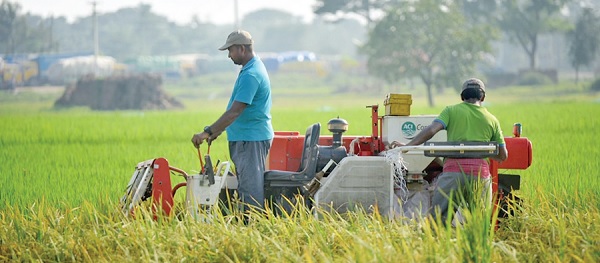
Agricultural mechanisation gap - Leveraging local knowledge for sustainable economic impact
Ghana has the potential to change the narrative by gradually closing the technological gap between basic and advanced levels of mechanisation.
Advertisement
This is where appropriate demand-driven intermediate agricultural technology comes into play, a strategy that our Asian counterparts, such as China, India, Bangladesh and others have mastered.
Through effective agricultural mechanisation, these countries have made enormous economic gains in their respective agriculture sectors.
Over several decades, the strategy was simply to improve the efficiency of existing rudimentary tools, before gradually progressing to the intermediate level with the application of relevant local knowledge.
Farmers gradually learned the operating principles of the various technologies developed, making adoption much easier.
They were then encouraged to increase their production area, resulting in the necessary upgrade to advanced agricultural mechanisation.
Farmers became the primary drivers and beneficiaries of the necessary change.
There is no better time than now for Ghana to look inward and develop its local content with reference to demand-driven appropriate intermediate agricultural technologies, giving the lessons learned from pandemics such as the novel COVID-19 and their lasting impact on world economies.
Agenda
The "Ghana beyond aid" agenda has recently included calls from the government to create local content.
The government’s efforts have produced the ideal political climate for this dream to become a reality.
A dream where Ghanaian farmers can have reliable access to rice reapers, threshers, mini combines, and other agro-processing equipment made locally, free from concerns about cost, availability of spare parts, suitability for the local environment, etc.
A dream where the service of local artisans is highly regarded.
A dream in which local knowledge becomes relevant to national economic development through demand-driven research.
Institutions
The existence of a good number of agricultural research institutions and universities in Ghana, as well as their roles in the sector, have contributed to the country's development of a robust domestic knowledge based relevant agricultural technology.
Over 5,000 agricultural technology-related student research projects or thesis, with the potential to improve the agricultural sector are undertaken yearly.
The unfortunate reality is that the vast majority of this ‘hidden gold’ ends up collecting dust on shelves.
These dissertations may be published in academic journals, but they rarely lead to practical solutions for the technological problems smallholder farmers face.
These college grads have the necessary background in agricultural mechanisation technologies, but they still have to attend the “youth unemployment academy” after school.
Statistics show that between 2009 and 2019, the youth unemployment rate in Ghana rose from 10.8 per cent to 13.7 per cent.
Intermediate agricultural technologies have been the subject of several research.
For example, a study by Amponsah et al., (2017) has proven that profit margins of over 200 per cent and a payback period of fewer than two growing seasons make intermediate mechanised rice harvesting systems the best financial bet, compared to manual and advanced methods.
There are several of such studies on various food staples available in the country's agricultural research institutions and universities.
The country has a large number of local artisans with the necessary expertise and capacity to manufacture almost any agricultural machinery.
Almost every town and village in the country has at least one welding shop.
With a little logistical and technical assistance, this group of workers can become the engines of agricultural technological advancement.
Conclusion
To sustainably revolutionise its agricultural sector and make a significant contribution to the country's economy, Ghana requires a mechanised intervention that will be accomplished through the development and adoption of appropriate intermediate technologies at the local level.
The idea is to combine current agricultural technology research expertise with local manufacturing know-how, as previously suggested.
Higher education institutions and research institutions will provide demand-driven research outcomes, while local artisans will provide fabrication expertise.
This merger is anticipated to generate a number of locally developed intermediate agricultural technologies that are applicable across food production units (crops and animals) and value chains.
Benefits
Among the anticipated benefits of this strategy are access to appropriate farm machinery and equipment, decreased youth unemployment, increased agricultural production and productivity, increased foreign exchange earnings, and sustainable food security.
The government is urged to assist in the implementation of the national agricultural mechanisation policy that incorporates suggestions made in this article.
To implement this strategy, the government, in collaboration with interested private investors, could expedite the establishment of an agricultural mechanisation research institute.
A government-led vision of this magnitude will necessitate close collaboration with key stakeholders, such as, academic institutions, research organisations, the Department of Food and Agriculture, traditional leaders, artisanal groups and others.
The implementation of this strategy won't be without its share of difficulties.
However, in the favourite quote, "if you have a mountain to climb, waiting does not make it look smaller," there is no better time to start than now.
Self-sufficiency in mechanised agricultural technologies is possible with the right mindset and commitment from all relevant stakeholders.
The writer is Senior Research Scientist,
CSIR-Crops Research Institute.




